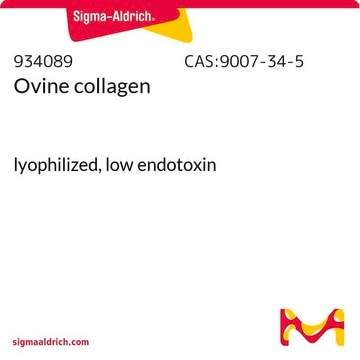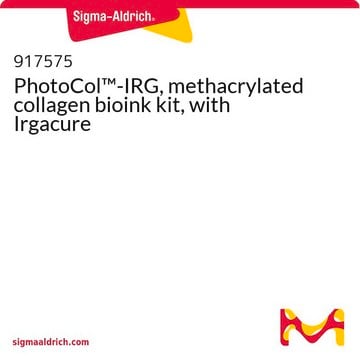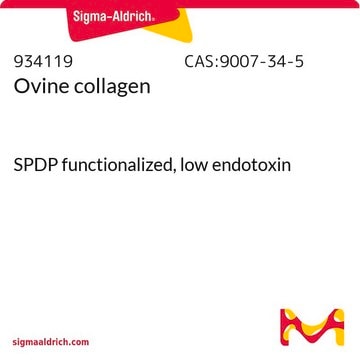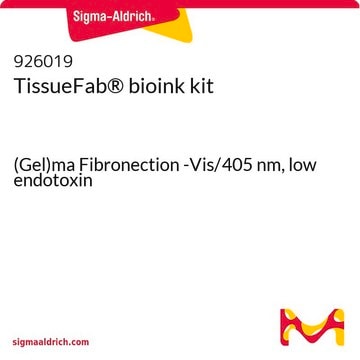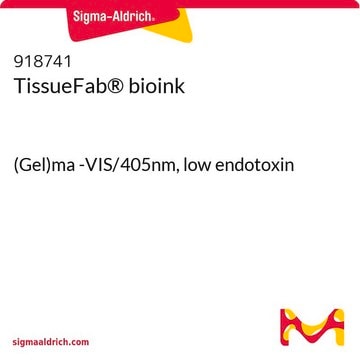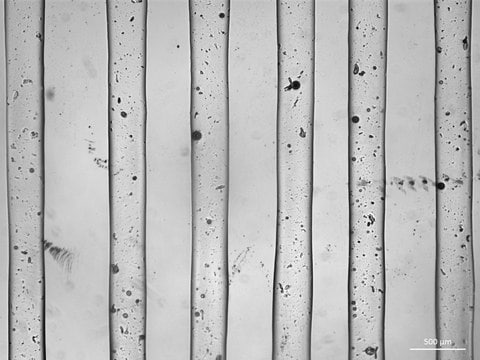934070
Ovine collagen
3 mg/ml solution, low endotoxin
Synonyme(s) :
CollOvine™ RD
Se connecterpour consulter vos tarifs contractuels et ceux de votre entreprise/organisme
About This Item
Produits recommandés
Niveau de qualité
Forme
liquid
Impuretés
low endotoxin
≤100 EU/g Endotoxin (collagen)
pH
2.5-4
Densité
1.01 g/mL± 0.02 g/mL
Catégories apparentées
Description générale
Collagen is a major component of the extracellular matrix (ECM) and offers low immunogenicity, a porous structure, good permeability, and biocompatibility to promote cell viability, adhesion, spreading, proliferation and differentiation. Low endotoxin ovine collagen solution is derived from sheep and is a bovine or porcine alternative that is highly purified, fully traceable, and low endotoxin making it suitable for many biomedical applications.
Application
- 3D bioprinting
- Tissue engineering
- Drug delivery
- Regenerative medicine
- Cell culture, encapsulation, expansion and differentiation
Caractéristiques et avantages
- Certified Disease Free Sheep
- 93-97% Type I Collagen
- 3-7% Type III Collagen
- 99% Purity
- Prion Free
Informations légales
CollOvine is a trademark of OviGenex LLC
Produit(s) apparenté(s)
Réf. du produit
Description
Tarif
Code de la classe de stockage
12 - Non Combustible Liquids
Classe de danger pour l'eau (WGK)
nwg
Point d'éclair (°F)
Not applicable
Point d'éclair (°C)
Not applicable
Certificats d'analyse (COA)
Recherchez un Certificats d'analyse (COA) en saisissant le numéro de lot du produit. Les numéros de lot figurent sur l'étiquette du produit après les mots "Lot" ou "Batch".
Déjà en possession de ce produit ?
Retrouvez la documentation relative aux produits que vous avez récemment achetés dans la Bibliothèque de documents.
Egor Olegovich Osidak et al.
International journal of bioprinting, 6(3), 270-270 (2020-10-23)
Biomaterials made using collagen are successfully used as a three-dimensional (3D) substrate for cell culture and considered to be promising scaffolds for creating artificial tissues. An important task that arises for engineering such materials is the simulation of physical and
Elizabeth E Antoine et al.
Tissue engineering. Part B, Reviews, 20(6), 683-696 (2014-06-14)
Type I collagen hydrogels have been used successfully as three-dimensional substrates for cell culture and have shown promise as scaffolds for engineered tissues and tumors. A critical step in the development of collagen hydrogels as viable tissue mimics is quantitative
Jana Stepanovska et al.
Biomedicines, 9(9), 1137-1137 (2021-09-29)
Bioprinting is a modern tool suitable for creating cell scaffolds and tissue or organ carriers from polymers that mimic tissue properties and create a natural environment for cell development. A wide range of polymers, both natural and synthetic, are used
Atiqah Salleh et al.
Biomedicines, 10(4), 816-816 (2022-04-24)
Tissue engineering products have grown rapidly as an alternative solution available for chronic wound and burn treatment. However, some drawbacks include additional procedures and a lack of antibacterial properties that can impair wound healing, which are issues that need to
Notre équipe de scientifiques dispose d'une expérience dans tous les secteurs de la recherche, notamment en sciences de la vie, science des matériaux, synthèse chimique, chromatographie, analyse et dans de nombreux autres domaines..
Contacter notre Service technique